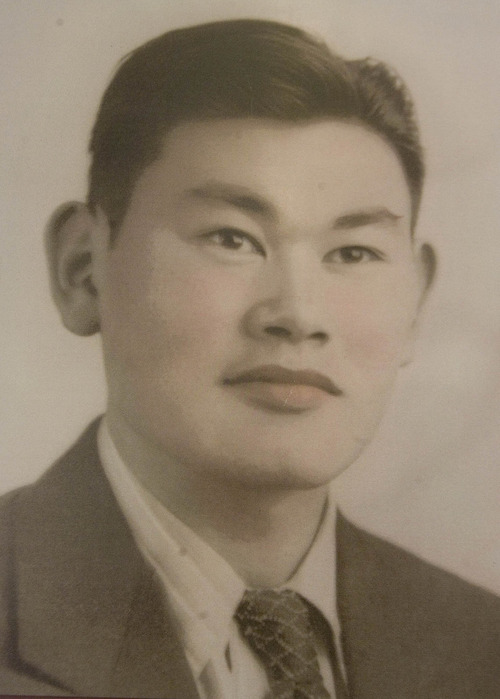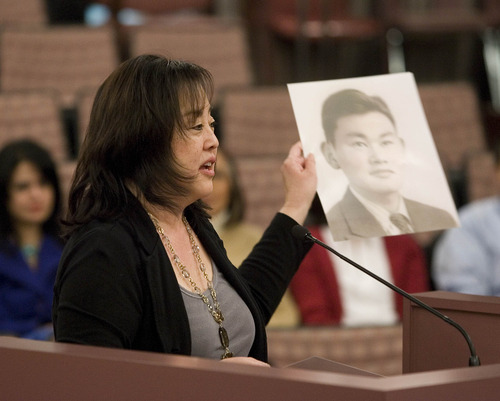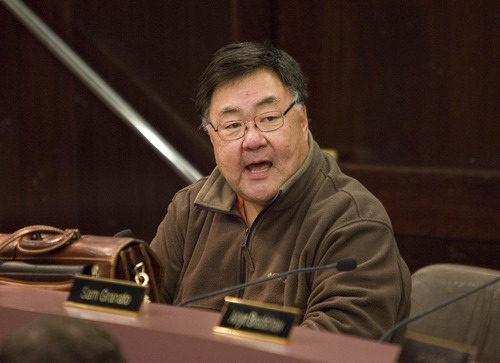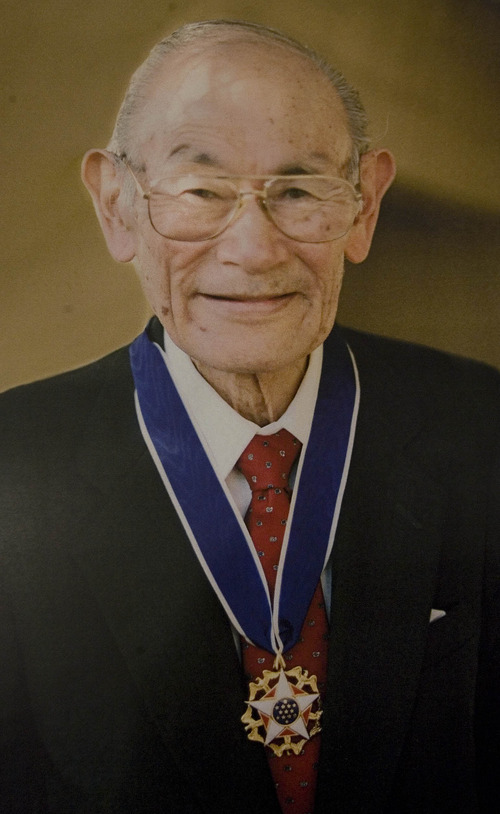This is an archived article that was published on sltrib.com in 2013, and information in the article may be outdated. It is provided only for personal research purposes and may not be reprinted.
Fred Korematsu lived under a cloud of suspicion as an internee at the Topaz internment camp in central Utah and when he left the camp to work in Salt Lake City during World War II.
But on Friday, Utah Gov. Gary Herbert will proclaim Jan. 30 as Fred Korematsu Day, honoring the man whose U.S. Supreme Court case challenging the internment of Japanese -Americans still stands as an example of racial injustice.
Korematsu would have been 94 on Jan. 30; he died eight years ago this spring.
The Salt Lake County Council on Tuesday passed a resolution supporting Herbert's proclamation. Jani Iwamoto, who stepped down from the County Council earlier this month, advocated for both.
"He was an ordinary person who did something extraordinary," Iwamoto told the council Tuesday. "Heroes like this are not necessarily big sports heroes or politicians. They're ordinary individuals."
Korematsu's case had a lasting impact on basic rights, said Iwamoto, who knew Korematsu as a humble man who decades earlier resisted military orders that sent 120,000 Japanese-Americans living along the West Coast into internment camps.
"Fred just knew [internment] was wrong instinctively," said Iwamoto, who first met Korematsu when she was a California law student who witnessed a 1980s effort to overturn his conviction. "He just wanted to live his life and be an American citizen."
Korematsu was arrested for resisting the military order in spring 1942. A welder born in Oakland, he was just 23 when he was convicted and sent to the Tanforan assembly center in California and then on to Topaz in the desert northwest of Delta.
His reception in the camp was chilly, according to family members and friends who discussed it with him, said Ling Woo Liu, director of the Korematsu Institute for Civil Rights and Education in California.
"It was a community totally under siege," and it could be that people were wary of associating with him. "Everyone coped with the trauma very differently," Liu said.
In any case, Korematsu had been confident he would prevail in court, and felt as if he had failed to vindicate his people, she said.
Korematsu lived on block 28 on the eastern side of the camp with his parents and three brothers, said Jane Beckwith, president of the volunteer board that plans to begin construction on the Topaz Museum in Delta this spring.
He lived in Topaz from late September 1942 until Feb. 4, 1944, but apparently had a temporary permit to work in Salt Lake City and moved there for several months after leaving the camp.
Korematsu went to Detroit as the war wound down, and there met his future wife, Kathryn. The couple returned to San Leandro, Calif., where they raised two children and he worked as an industrial draftsman.
Beckwith met Korematsu several times in California.
"I look at him as a very courageous man who dealt with internment for all his life, she said. "He was a champ of civil rights."
Iwamoto met Korematsu as a law student at the University of California at Davis in the early 1980s, as she worked as an intern for a member of the legal team that got Korematsu's case reopened. She watched the evening strategy sessions, which occasionally included Korematsu.
A judge in 1983 agreed that the government had suppressed, altered or destroyed evidence that contradicted its 1942 claim that there was military necessity for the mass evacuation and incarceration. She reversed Korematsu's conviction.
The Supreme Court did not rehear the case, but his victory paved the way for the Civil Liberties Act of 1988, through which each survivor of the camps received $20,000 from the government.
Twenty years ago, Iwamoto brought Korematsu to Utah to speak at a Utah Minority Bar dinner. That may well have been the only time Korematsu returned to Utah after the war, Liu said.
The Korematsu institute, founded in 2009, is trying to spread his story more widely.
The California Assembly in 2010 voted to celebrate Fred Korematsu Day every Jan. 30. Hawaii and Utah are celebrating the day this year as a one-time event. Michigan, where Korematsu lived after leaving Utah and where he met his wife, is having a Jan. 30 event to celebrate him as well, Liu said.
"It's not just about the day," Liu said. "It's about what Mr. Korematsu represented and the lesson he imparted to all of us: don't be afraid to speak up if you see something wrong."
Tribune reporter Mike Gorrell contributed to this story. —
Proclaiming Fred Korematsu Day
Utah Gov. Gary Herbert will sign a proclamation designating this Jan. 30 as Fred Korematsu Day on Friday at 1:15 p.m. The ceremony will be held in the State Capitol's Gold Room, which is on the second floor near the governor's office.









